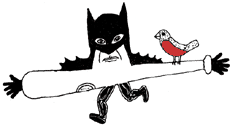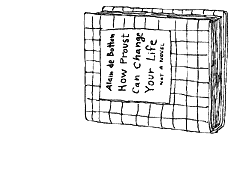
Movies
Batman & Robin (Warner Bros.). Critics dismiss the fourth installment in the Batman series as nonsensical kitsch, a "wild, campy costume party" (Janet Maslin, the New York Times). Director Joel Schumacher (A Time to Kill), a former window dresser, leans heavily on high-concept get-ups (villainess Uma Thurman sports a suit made from 450 Santa Claus wigs) in the apparent hope of deflecting attention from a script that "has the eerie feeling of having no beginning, no middle and no end" (Kenneth Turan, the Los Angeles Times). Still, his overwrought attempts to make the film fun--fast editing, crashingly loud sound effects--end up making it "a punishing ordeal" (Alex Ross, Slate). (See the Batman & Robin site.)
Face/Off (Paramount Pictures). Hong Kong director John Woo's action flick stands out as the best, by far, in a bad summer crop. Critics ignore the absurd premise--a cop (John Travolta) and a villain (Nicolas Cage) each undergoing plastic surgery to look like the other one--and take unabashed delight in the movie's "grandly operatic pulp" (David Ansen, Newsweek). Reviews credit Woo with giving violence "balletic grace" (Todd McCarthy, Variety) as well as "moral gravity" (Richard Corliss, Time). Cage and Travolta are deemed "two of the most daring, physically intuitive, soulful performers on screen" (Ansen). (Click here for the Face/Off site.)
La Promesse (New Yorker Films). Veteran Belgian documentarians Luc and Jean-Pierre Dardenne win acclaim for their film about a 15-year-old boy's pledge to a dying Ghanaian immigrant to look after his family. A "minimalist marvel," says the Wall Street Journal's Joe Morgenstern. Reviews dwell on the directors' effective hand-held camera and their subtle depiction of the ordeals of immigrant life. The New Republic's Stanley Kauffmann says the Dardenne brothers can join Ken Loach and Mike Leigh in "the front rank of contemporary directors with social concerns."
Musical
Ragtime (Schubert Theatre, Los Angeles). The musical adaptation of E.L. Doctorow's 1975 novel about turn-of-the-century America is crowned as an instant classic. Terrence McNally and Lynn Ahrens' show, says Time's Richard Zoglin, "combines big social themes, imaginative staging and emotionally involving storytelling in a way that has all but vanished from the American musical." Controversy surrounds the show's producer, movie-theater mogul Garth Drabinsky, "the current mahatma of musical theatre" (John Lahr, The New Yorker): Will he restore glory to the American musical as he bankrolls other blockbusters, or will his productions simply serve as a vehicle for his own ego?
Books
The Puttermesser Papers, by Cynthia Ozick (Knopf). Though eclipsed somewhat by Philip Roth's and Saul Bellow's new novels, Cynthia Ozick's latest gets glowing reviews just the same. The story of the travails of a brainy single Jewish female in New York is lauded as a "wry modern fable" (Merle Rubin, the Wall Street Journal) that shows off Ozick's flair for Isaac Bashevis Singer-style magical realism. Praise also for Ozick's relentless skepticism about modern urban life, which is said to be reminiscent of Bellow, "a vision that is stark and unsparing but ... so intelligent ... it remains endearing, edifying, a spark of light in the gloom" (Richard Bernstein, the New York Times). (See David Remnick's review in Slate and click here for an excerpt.)

How Proust Can Change Your Life: Not a Novel, by Alain de Botton (Pantheon Books). Critics applaud this semisatirical reinterpretation of Proust's 3,000-page novel Remembrance of Things Past as a nine-step self-help book. (One chapter title: "How to Suffer Successfully.") The book, they say, is a witty sendup of therapeutic literature, and it also serves as a "seriously legitimate guide for the perplexed" (Benito Rakower, the Washington Post). Critics also recommend it as a sort of highbrow Cliff's Notes: "You don't need to have read Proust in order to read this book; in fact, once you've read de Botton you don't need to read it at all" (Richard Klein, Voice Literary Supplement).
Bright Angel Time, by Martha McPhee (Random House). This roman-à-clef by writer John McPhee's daughter portrays him as ridiculously irresponsible. Still, critics say the daughter has inherited the father's "gift for fine, lapidary prose [and] carefully controlled language" (Michiko Kakutani, the New York Times). The book wins praise largely because of its keen rendering of the self-indulgent '70s. "What might have been a one-trauma-after-another chronicle of loss and divorce," says Walter Kirn in the New York Times Book Review, "becomes instead a hard and shining artifact of personal and social upheaval." Reviewers also approve of the eccentric characters, especially the 8-year-old LSD-dropping narrator.
Updates
The New Republic's Robert Brustein says the Tony-winning adaptation of A Doll's House "is driven by fashionable agendas ... [a] resolutely ahistorical reinterpretation ... largely designed to illustrate how a powerful woman can shatter glass ceilings." ... Also in the New Republic, Robert Boyers offers some unwonted negative words for Philip Roth's American Pastoral, saying the book caricatures 1960s radicalism. "It does not tell us what we need to know about America, what a novel can tell us about the complex attitudes and allegiances of a time and a place."
Recent "Summary Judgment" columns
Movie--Hercules;
Movie--Speed 2;
Movie--My Best Friend's Wedding;
Architecture--Shakespeare's Globe Theatre;
Book--News of a Kidnapping, by Gabriel García Márquez, translated from the Spanish by Edith Grossman;
Book--The Diving Bell and the Butterfly, by Jean-Dominique Bauby, translated from the French by Jeremy Leggatt;
Book--The God of Small Things, by Arundhati Roy;
Book--The Perfect Storm, by Sebastian Junger;
Art--"Venice Biennale."
Movie--Con Air;
Movie--Ulee's Gold;
Movie--The Pillow Book;
Music--Wu-Tang Forever, Wu-Tang Clan;
Book--Without a Doubt, by Marcia Clark, with Teresa Carpenter;
Book--Firewall: The Iran-Contra Conspiracy and Cover-Up, by Lawrence E. Walsh;
Book--Promiscuities: The Secret Struggle for Womanhood, by Naomi Wolf;
Theater--Gross Indecency: The Three Trials of Oscar Wilde.
Movie--Trial and Error;
Music--Blood on the Dance Floor--HIStory in the Mix, Michael Jackson;
Television--Bill Clinton: Rock & Roll President (VH1);
Television--Port Charles (ABC);
Book--Race, Crime, and the Law, by Randall Kennedy;
Book--Virginia Woolf, by Hermione Lee;
Book--Kowloon Tong, by Paul Theroux;
Event--The Tony Awards;
Art--"Objects of Desire: The Modern Still Life" (Museum of Modern Art).
Movie--The Lost World;
Movie--Addicted to Love;
Movie--Brassed Off;
Television--Murder One (ABC);
Theater--King David;
Music--Flaming Pie, by Paul McCartney;
Book--Che Guevara: A Revolutionary Life, by Jon Lee Anderson;
Book--Rage for Fame: The Ascent of Clare Boothe Luce, by Sylvia Jukes Morris;
Art--New Chinese Galleries (Metropolitan Museum of Art).
--Compiled by Franklin Foer and the editors of Slate.
